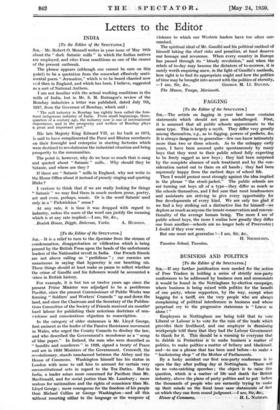[To thefiditor of the SPECTATOR.] Sul,—It is a relief to
turn to the Spectator from the stream of condemnation, disapprobation or vilification which is being poured by the British Press upon the heads of the unfortunate leaders of the Nationalist revolt in India. Our French friends are not above calling us " perfidious " ; our enemies are unanimous in saying that hypocrisy is , our besetting sin. These things should at least make us pause to reflect whether the crime of Gandhi and his followers would be accounted a crime in British history.
For example, it is but ten or twelve years ago since the present Prime Minister was adjudged to be a pestiferous Pacifist since the present Commissioner of Public Works was forming " Soldiers' and Workers' Councils " up and down the land, and since the Chairman and the Secretary of the Publica- tions Committee of the Society of Friends received six months' hard labour for publishing their notorious doctrines of non- violence and conscientious objection to conscription.
In the category of older statesmen is Mr. Lloyd George, first eminent as the leader of the Passive Resistance movement in Wales, who urged the County Councils to disobey the law, and who described the Government's mandamus as a " strap of blue papers" In Ireland, the men who were described as " bandits and murderers " in 1920, signed a treaty of Peace and are in 1930 Ministers of the Government. Cromwell, the revolutionary, stands unashamed between the Abbey. and the House of Commons. Washington himself has his statue in London with none to call him- to account fore certain very unconstitutional acts in regard to the Tea Duties. But in India, a leader arises more concerned for Pacifism than Mr. MacDonald, and for social justice than Mr. Lansbury; more zealous for nationalism and the rights of conscience than Mr. Lloyd George ; more courageous for the freedom of his people than Michael Collins or George Washington—and all this without resorting either to the language -or the weapons of violence to which our Western leaders have too often suc- cumbed.
The spiritual ideal of Mr. Gandhi'and his political method of himself taking the chief risks and penalties, at least deserve our homage and reverence. When every country in Europe has passed through its " bloody revolution," and when the rebels of to-day may become the dictators of to-morrow, it is surely worth enquiring anew, in the light of Gandhi's methods, how right is to find its appropriate might and how the politics of time may be brought into accord with the politics of eternity.
—I am, Sir, &c., GEORGE M. Ll. DAVIES. The Manse, Towyn, Merioneth.






































 Previous page
Previous page